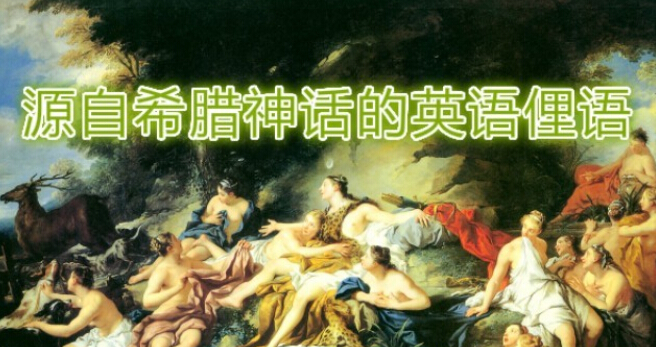
Heyang: 歡迎收聽這周的英語詞匯小百科,我是赫揚。
John: Yeah, so this week we are looking at idioms in the English language related to Greek and Roman mythology. A lot of these are used quite often in English. It’s similar to成語 I suppose. Just because it’s a huge part of our culture, that for many people, we don’t even necessarily question where they come from. So the first one is Pandora’s Box, for example to open a Pandora’s Box means to invite trouble.
Heyang: 潘多拉的魔盒,你一定聽說過,其實它的意思是災禍之源,也許不是一個非常吉利的說法。It’s that a little bit unfortunate to say it?
John: Definitely. The problem with Pandora’s Box is you never know exactly what’s going to be in there. Some of them might be good, but most of it is probably going to be bad.
Heyang: And also isn’t that the name of the planet in the movie Avatar, I wonder if there is any association there.
John: And the next one is the Oedipus Complex. This was actually coined by Sigmund Freud. Basically it was the psychological concept that all men want to kill their father and marry their mother and this is basically what ended up happening to Oedipus, even though he did not know it.
Heyang: 歐狄浦斯情結,也就是戀母情結,是常常來形容這種讓人覺得有一點點亂倫的感覺的一種男女之間的關系。
John: Yeah, and so really these days it’s used more just to describe perhaps a bit of an unhealthy relationship between a mother and her son. And the opposite or perhaps the complementary complex for girls, called the Electra Complex, very, very similar, you know that somehow the girl wants to replace the mother in the father’s relationship.
Heyang: 那這個就是戀父情結了。
John: And there is the Trojan Horse. I think most people are publicly familiar with this term already. Trojan Horse, basically, it is a threat that is wrapped up in some type of present or something like that.
Heyang: Trojan Horse就是內部的破壞集團的意思,同時也有隱藏的危險的意思。And in the modern world, is it used to describe the computer virus as well?
John: Those are Trojan. Trojan viruses are viruses that get on to your hard drive or your computer somehow and don’t do anything until they are triggered by certain events or just maybe like a time bomber or something like that. And there is Achilles’ Heel, so the weakness of an individual which ends up leading to his downfall.
Heyang: 這個詞的意思是致命的弱點。
John: Then the Midas Touch. We don’t use it so often any more, but certainly everyone knows what you are talking about if you do use this. So the Midas Touch means basically a person who is always lucky and is said to have the Midas Touch. So Midas was a king who wished that everything he touched turned to gold. It’s actually a bit of tragic story, but the way we use it these days is more positive.
Heyang: 這個意思就是點石成金術,而且同時形容某些人十分的幸運,但是現在使用率并不是那么高了。
John: And then there is the Sword of Damocles, so it’s imminent and ever-present peril faced by those in positions of power. So the idea is the Sword of Damocles hanging above your head and might drop down at any moment.
Heyang: 達摩克利斯之劍, 同時也意味著時刻存在的危險。
John: And there is the Gordian Knot, which is an extremely perplexing puzzle or problem. Very, very interesting story behind this one: Alexander the Great, came upon the Gordian knot, it was fame throughout the entire world that no one could actually untie this knot. And you know how he solved this problem?
Heyang: How did he do it?
John: Just cut it in half with a sword.
Heyang: That sounds very much like something that Alexander the Great would do. 戈耳迪之結就是非常難解之題。
John: And then there is the apple of discord. It can be any subject of disagreement and contention.
Heyang:不和的根源、發生糾紛的事端就是apple of discord的意思。
John: And the last but not least, Swan Song, a final gesture, effort, or performance given just before death or retirement.
Heyang:天鵝挽歌,也就是最后的杰作的意思。這個是個很簡單的詞,可以把它記起來喲。











